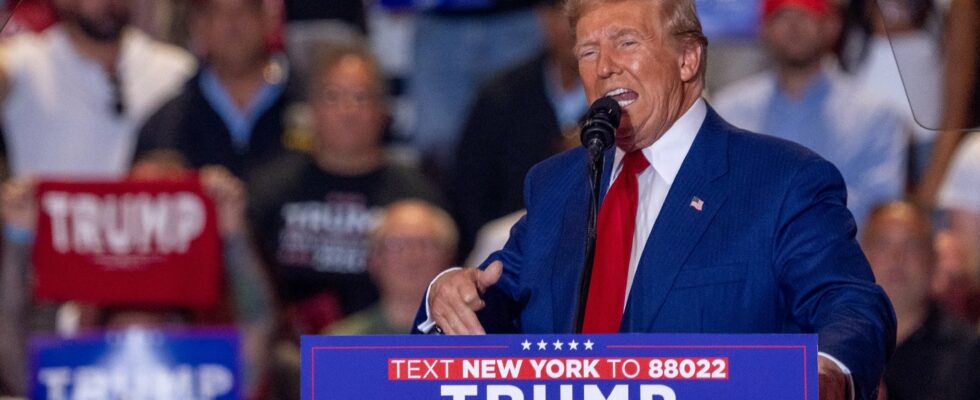For a politician on the campaign trail, the choice of cities where his meetings take place is no coincidence. Its history, its symbols or even its territory, are all elements on which to rely in a speech in order to captivate the audience and get his ideas across. On Wednesday, September 18, Donald Trump chose to speak on Long Island. Part of this island belongs to the city of New York, which was once, via Ellis Island, the gateway for immigration to the United States. Between 1892 and 1924, more than 16 million migrants, the vast majority of whom came from Europe, passed through there to live the American dream.
The former White House tenant is fighting this ideal with force. During more than an hour and a half of speech, the Republican presidential candidate once again virulently attacked migrants, multiplying diatribes and warnings. Like the one on the future of the Big Apple which could, according to him, “soon become a third-world country”. “They come from Africa, the Middle East, all over the world, from Asia […] “We are simply destroying our social fabric,” Donald Trump told a crowd that supported his cause.
The fight against immigration is, as in 2016, one of the central themes of his campaign. If elected, the American billionaire intends to go even further and promises to send back more than 11 million undocumented people. “Nobody knows what Donald Trump is really going to do. But one thing is certain, his advisors, in particular Stephen Miller who is a key person, are very opposed to immigration and want to reduce all existing legal forms,” says a consultant, specialist in these issues, based in the United States.
Foreigners at the origin of 23% of patents
A radical policy that could affect the country’s economy, as immigrants contribute to innovation in many sectors. “I am extremely concerned. If you start cracking down on skilled immigrants from countries like Iran or China, it will have an impact on innovation. And that is the engine of American growth. I fear that this type of measure will have long-term effects,” says Pol Antràs, professor of economics at Harvard.
In recent years, many studies have documented their role in the development of new technologies. In 2022, the National Bureau of Economic Research showed that, although they only represent 16% of all inventors in the United States, those of foreign nationality produced approximately 23% of patents filed between 1990 and 2016 in the country. “They are more creative. It is essential to have people from diverse educational systems. When you don’t have the same training or the same family environment, you don’t think in the same way,” points out Emmanuelle Auriol, professor of economics at the Toulouse School of Economics and author, with her colleague Hillel Rapoport, of a note from the Economic Analysis Council on the subject.
In the teeming ecosystem of startups, more than half of those valued at $1 billion or more were founded by immigrants, according to an analysis by the National Foundation for American Policy (NFAP). “The United States has a strong venture capital ecosystem where a foreigner can come to our country and present a good idea,” explains Stuart Anderson, executive director of this American nonprofit organization. “No one cares where you come from, and if you can convince other people that your project will be profitable, people will fund it. Ultimately, this benefits the entire economy by creating jobs and wealth.”
In the artificial intelligence sector, where the United States already has a head start, immigrants are overrepresented. “They tend to be more entrepreneurial than non-immigrants. They are more active and perhaps believe in themselves more. That’s also part of the reason why they do so well in the United States,” adds Johann Harnoss, associate director for innovation at the Boston Consulting Group.
“Hostile and dissuasive environment”
While Donald Trump specifically targets undocumented immigrants, he continues to maintain an ambiguous position on skilled immigration. Last June, the Republican promised to grant a permanent visa to all foreign students who graduated from an American university. A measure considered beneficial for the economy by many experts, but paradoxical. “He is creating a hostile and dissuasive environment. It is extremely difficult to both pursue an anti-immigration policy and say that highly educated people are welcome,” emphasizes economist Hillel Rapoport.
There is no room for procrastination, however. The demand in technology sectors will grow dramatically in the coming years, and the American population will not be able to meet it. In the semiconductor industry alone, companies will need to hire more than 230,000 highly skilled people over the next decade. “The country needs to attract the world’s brightest engineers to contribute to its technology ecosystems because we have gaps in our domestic talent pool,” says Stephen Ezell, vice president of the Information Technology and Innovation Foundation, a Washington-based think tank.
At the same time, implementing Donald Trump’s program to the letter could encourage the desire to leave. “You will see companies moving more resources outside the United States, including to Canada, India or Europe, if they are not able to employ the people they want,” notes Stuart Anderson of the NFAP. With American growth likely to slow next year, a blow to innovation would be ill-advised.
.
